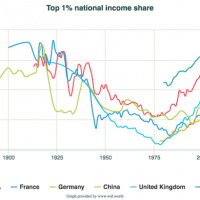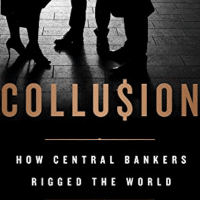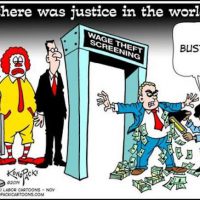-
U.S. workers and their decades of lost earnings
It happened gradually, but thanks to the U.S. media, economic news has largely been reduced to stock market reporting. Want to know how the economy is doing? Check the S&P 500 Index. Want to know whether the latest Trump proposal is good or bad? Check the S&P 500 Index.
-
Utopia and inequality
Economic inequality is arguably the crucial issue facing contemporary capitalism—especially in the United States but also across the entire world economy.
-
Janus and fair share fees
Over the last decade, a number of cases attacking the rights of public-sector union members have been quietly working their way through the courts and, finally, up to the U.S. Supreme Court.
-
Are intersectionalism or Afro-Pessimism paths to power? (Part 3 of 3)
In parts one and two of this series I’ve talked about the fact that there are two conflicting versions of intersectionality, one employed by some honest to god leftists who reach backward across decades to ventriloquize the term into the mouths of the Cohambee comrades, of Audre Lord, even of Claudia Jones and Sojourner Truth, and how this exists alongside another, hegemonic version of intersectionality deployed by the corporate funded lawyers, media and the nonprofit sector which invented the term in the first place for reasons Cohambee or Claudia Jones would never touch.
-
Tomgram: Nomi Prins, how to set the economy on fire
There’s no way to measure just how cheery this period really is — not if you’re the CEO of a major company. Just as the World Economic Summit was opening in Davos, Switzerland, and President Donald Trump was flying in to put his mark on the moment, PwS, a global consulting firm, released its annual survey of 1,300 CEOs.
-
How should socialists understand finance: remembering the lessons of Capital
For those on the Left, finance seems like a bourgeois pastime. Many of us outright despise the stuff. While the petit bourgeoisie drool over dividends and diversification, we prefer to focus on crisis and class.
-
Value, credit and crisis: Reading Marx out of context can lead to confusion
A literalist, out-of-context reading of Marx can get one into trouble, or at the very least, leave you hopelessly confused. For help, I look to David Harvey. Perhaps the preeminent expert on Marx’s Capital in the English-speaking world, Harvey meticulously reconstructed Marx’s approach to money in his major treatise, Limits to Capital (1982).
-
Warren Buffett & imperial economics
Warren Buffett is one of the wealthiest people in the world. He is also Chairman of the Board, President and Chief Executive Officer of Berkshire Hathaway, a huge U.S. investment conglomerate. Looking at Berkshire’s investment policy reveals some important features of the economics of imperialism today and the role of money capitalists.
-
Dutiful dirges of Davos
Thousands of people will gather next week in Davos. Their combined wealth will reach several hundred billion dollars, perhaps even close to a trillion. Never in world history will be the amount of wealth per square foot so high. And this year, for the sixth or seventh consecutive time, what would be one of the principal topics addressed by these captains of industry, billionaires, employers of thousands of people across the four corners of the globe: inequality…
-
The Billionaire boom: 82% of global wealth produced last year went to richest 1%
Forida is a 22-year-old sewing machine operator in a clothing factory in Dahka, Bangladesh. She often works 12-hour days producing clothes for brands such as H&M and Target. Sometimes, during busy production cycles, the hours are even longer.
-
Profits before people: capitalists abandon Alzheimer’s and Parkinson’s research
Pharmaceutical giant Pfizer will stop research on Alzheimer’s and Parkinson’s disease, and is expected to lay-off 300 research and development staff in Massachusetts and Connecticut, in a move that could severely hamper progress towards effective treatments for these illnesses – proving that critical medical research cannot be left in the hands of capitalist profiteers.
-
The next financial crisis will be even worse than the last one
We’ve made it through 2017. The first-season installment of presidential Tweetville is ending where it began, on the Palm Beach, Fla., golf course of Mar-a-Lago. Though we are no longer privy to all the footage behind the big white truck, we do know that, given the doubling of its membership fees, others on the course will have higher stakes in the 2018 influence game.
-
Can we avoid another financial crisis?
After the Global Financial Crisis, Steve Keen achieved worldwide acclaim with his book Debunking Economics (2011). It attacked the core tenets of neoclassical economics and some of its heterodox rivals. It also revealed Hyman Minsky’s post-Keynesianism as the most promising route to a scientific revolution in economics.
-
Making merry on bitcoin
Bitcoin has left the world of finance gasping. Although the total market value of all that cryptocurrency in circulation is only a fraction of the value of the world’s financial assets, the rapid rise in the value of the currency has made it the most wanted of those assets. On January 1, 2017, the currency was trading between $972 and $990 a unit. By December 7, it was trading between $14,063 and $17,363.
-
Two billion dollars in stolen wages were recovered for workers in 2015 and 2016—and that’s just a drop in the bucket
The last four decades have been marked by rising wage inequality, with the vast majority of American workers experiencing wage stagnation while those at the top rung of the economic ladder reap the benefits of growth in productivity. These dynamics mean that many workers struggle to make ends meet; in 2016 one in five families in which at least one person worked were living below 200 percent of the federal poverty line (U.S. Census Bureau 2017).
-
Debt comes for us all
“DON’T LET YOUR CHILDREN GO INTO CRIPPLING DEBT LIKE I HAVE!” I shout, as I and a group of students with SENS-UAW make our way to a major intersection just off Union Square. We wave signs, hoist our banner and merge into the crowd. We are protesting the new GOP tax bill, which will affect the lives of current, previous, and prospective students in critical and long-lasting ways.
-
Employers would pocket $5.8 billion of workers’ tips under Trump administration’s proposed ‘tip stealing’ rule
On December 5, the Trump administration took its first major step toward allowing employers to legally pocket the tips earned by the workers they employ. The Department of Labor (DOL) released a proposed rule that would allow restaurants to take the tips that servers earn and share them with untipped employees such as cooks and dishwashers.
-
“Colombia is safe for business, but not for people”
Murders of trade unionists and social leaders, paramilitary activity, coca production… If we only paid attention to the mainstream media we would not get the idea that these problems are actually growing in Colombia, one year after the peace agreement between the Colombian government and the FARC came into place. To get a better picture and understand how all these elements connect to US policy and corporate interests, we interviewed Daniel Kovalik, a lawyer and human rights activist who has long been involved in the struggle for peace and justice in Colombia.
-
Tax cuts: It’s all about capitalism
Powerful corporations and the rich in the United States continue their winning ways. By narrow margins, both the House of Representatives and Senate have agreed on a budget proposal that calls for an increase in the federal deficit of $1.5 trillion dollars in order to fund a major reform of the U.S. tax system that will make the rich and powerful even more so.
-
Radical municipalism
Last week saw a flurry of humiliating pitches by North American cities for Amazon to pick them as the location of the corporation’s second headquarters.




















